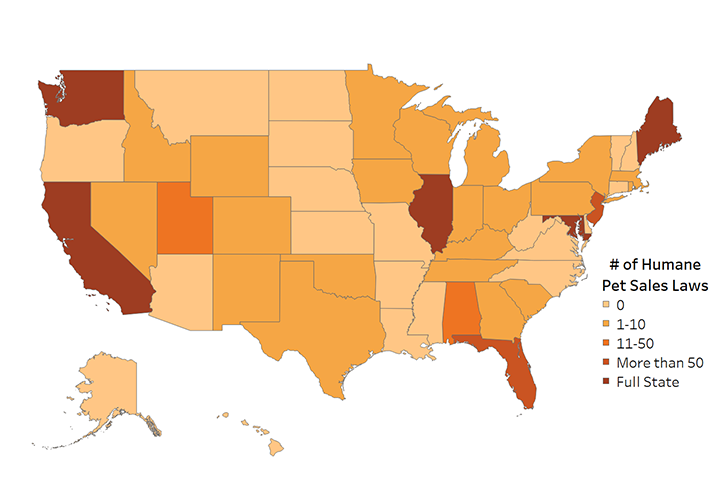
Combating Puppy and Kitten Mills with Legislation
For every commercially bred puppy or kitten purchased from a breeder or retailer, there is a pet in a shelter, waiting for a home. In 2023, 380,000 dogs and cats were killed in shelters across the country simply because they didn't have a safe place to call home. Meanwhile, pet mills continue to churn out countless animals for the pet trade. But people like you are helping jurisdictions throughout the country break this cycle, saving lives and taxpayer dollars by enacting local ordinances to fight the cruelty of puppy and kitten mills.
Your vote and your voice matter
Local officials make decisions every day that affect our daily lives, including what happens to cats and dogs in our communities. If you want their decisions to be the right ones, then you need to be informed and involved.
As a voter, your opinion matters. You can help save cats and dogs in your community by working with your city council or other governing body to create a lifesaving animal ordinance.
Animal protection at the source
Laws that regulate commercial breeding require breeders to be licensed and inspected and create minimum standards of care for the animals - standards often stronger than those created by federal law. When pet mills are subject to inspection, they become less profitable as more money is required to invest in the care of the animals, making shutting down altogether more likely.
Consumer protection
Pet store disclosure bills require stores to post the animals' health records, along with the name and location of the breeder, so that customers can see where the pets for sale were bred. This information can help consumers make a more informed decision about whether they should purchase a particular pet.
Pet lemon laws offer better protection for consumers and greater recourse for buyers of sick pets. As with breeding regulations, this type of law increases the costs of doing business for mill-supplied pet stores by requiring them to provide pet warranties.
Retail sales

Bans on the sale of animals in public places are important since illegitimate breeders often use public venues to sell animals who are underage, unhealthy, not vaccinated and not spayed or neutered. These sales are usually unregulated, with no accountability on the part of the seller. Sadly, many of the pets are purchased impulsively and are surrendered to shelters when the cost of caring for them becomes unmanageable
Retail pet sales restrictions prohibit the sale of dogs and cats (and often rabbits) in pet stores. Hundreds of cities and counties across the U.S., as well as several states, have enacted these ordinances, and there are many more in the works. Legislation that focuses on animal sales is effective because it addresses the problem of mills and backyard breeders from the retail point of sale. Restricting the market for pets from puppy and kitten mills reduces the incentive to produce them.
Because the retail pet sales ordinances include an exemption for pet stores that showcase animals for adoption from shelters or rescue groups, it's a win-win for the animals and the community. Not only are stores no longer supporting the cruelty of pet mills or adding to shelter crowding by importing poorly bred animals into the community, they're actually helping to relieve the burden on the shelters by getting animals into pet stores, where they can be seen by more potential adopters. Find out which communities have retail pet sale bans.
Best Friends, other animal welfare groups, local activists and concerned individuals are working with lawmakers around the country to improve the lives of animals and people in their communities. These efforts are having a profound effect on the fight against puppy and kitten mills. Please join us. Working together, we can Save Them All.
Positive change in your community starts with you
Your voice is a powerful force for pets and people at the city, county, and state levels, as well as nationally. If you are ready to help local pets and create a compassionate no-kill community where you live, join the 2025 Action Team.